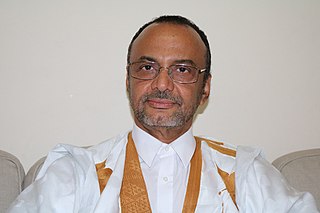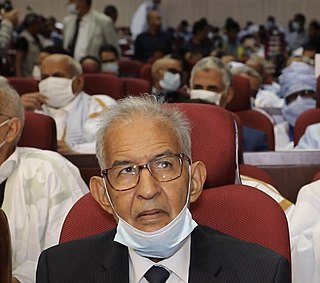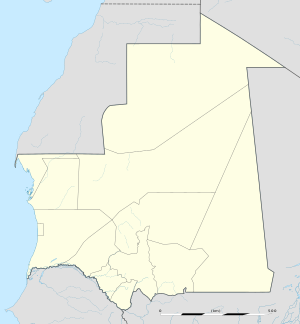
Saint Louis or Saint-Louis, is the capital of Senegal's Saint-Louis Region. Located in the northwest of Senegal, near the mouth of the Senegal River, and 320 kilometres (200 mi) north of Senegal's capital city Dakar. It had a population of 254,171 in 2023. Saint-Louis was the capital of the French colony of Senegal from 1673 until 1902 and French West Africa from 1895 until 1902, when the capital was moved to Dakar. From 1920 to 1957, it also served as the capital of the neighboring colony of Mauritania.

Arguin is an island off the western coast of Mauritania in the Bay of Arguin. It is approximately 6 km × 2 km in size, with extensive and dangerous reefs around it. The island is now part of the Banc d'Arguin National Park.

Sidi Mohamed Ould Boubacar is a Mauritanian politician who has been Prime Minister of Mauritania twice, from 1992 to 1996 and again from 2005 to 2007.

The National Assembly is the unicameral legislative house of the Parliament of Mauritania. The legislature currently has 176 deputies, elected for five-year terms in electoral districts or nationwide proportional lists.

The foreign relations of the Islamic Republic of Mauritania have, since 1960, been dominated by the issues of the Spanish Sahara and the recognition of its independence by its neighbours, particularly Morocco. Mauritania's foreign relations are handled by the Minister of Foreign Affairs and Cooperation, who is currently Mohamed Salem Ould Merzoug.

Ahmed Ould Daddah is a Mauritanian economist and a politician. He is a half-brother of Moktar Ould Daddah, the first President of Mauritania, and belongs to the Marabout Ouled Birri tribe. He is currently the President of the Rally of Democratic Forces (RFD) and was designated as the official Leader of the opposition following the 2007 presidential election, in which he placed second.
The People's Progressive Alliance is a small political party in Mauritania.

The Western Sahara War was an armed struggle between the Sahrawi indigenous Polisario Front and Morocco from 1975 to 1991, being the most significant phase of the Western Sahara conflict. The conflict erupted after the withdrawal of Spain from the Spanish Sahara in accordance with the Madrid Accords, by which it transferred administrative control of the territory to Morocco and Mauritania, but not sovereignty. In late 1975, the Moroccan government organized the Green March of some 350,000 Moroccan citizens, escorted by around 20,000 troops, who entered Western Sahara, trying to establish a Moroccan presence. While at first met with just minor resistance by the Polisario Front, Morocco later engaged a long period of guerrilla warfare with the Sahrawi nationalists. During the late 1970s, the Polisario Front, desiring to establish an independent state in the territory, attempted to fight both Mauritania and Morocco. In 1979, Mauritania withdrew from the conflict after signing a peace treaty with the Polisario Front. The war continued in low intensity throughout the 1980s, though Morocco made several attempts to take the upper hand in 1989–1991. A cease-fire agreement was finally reached between the Polisario Front and Morocco in September 1991. Some sources put the final death toll between 10,000 and 20,000 people.
In December 1984, Haidallah was deposed by Colonel Maaouya Ould Sid'Ahmed Taya, who, while retaining tight military control, relaxed the political climate. Ould Taya moderated Mauritania's previous pro-Algerian stance, and re-established ties with Morocco during the late 1980s. He deepened these ties during the late 1990s and early 2000s as part of Mauritania's drive to attract support from Western states and Western-aligned Arab states. Mauritania has not rescinded its recognition of Polisario's Western Saharan exile government and remains on good terms with Algeria. Its position on the Western Sahara conflict has been, since the 1980s, one of strict neutrality.

Mohamed Ould Abdel Aziz is a retired Mauritanian military officer and politician who served as the 8th president of Mauritania from 2009 to 2019.

Mauritania, formally the Islamic Republic of Mauritania, is a sovereign country in Northwest Africa. It is bordered by the Atlantic Ocean to the west, Western Sahara to the north and northwest, Algeria to the northeast, Mali to the east and southeast, and Senegal to the southwest. By land area Mauritania is the 11th-largest country in Africa and 28th-largest in the world; 90% of its territory is in the Sahara. Most of its population of some 4.3 million lives in the temperate south of the country, with roughly a third concentrated in the capital and largest city, Nouakchott, on the Atlantic coast.
Moulaye Ould Mohamed Laghdaf served as the Prime Minister of Mauritania from August 2008 until August 2014.

The Alliance for Justice and Democracy/Movement for Renewal is a small political party in Mauritania. It represents the black minority population of the south of the country, centered on the Senegal River valley, and was formed and was led by rights activist and former presidential candidate Ibrahima Moctar Sarr.

G5 Sahel or G5S is an institutional framework for coordination of regional cooperation in development policies and security matters in west Africa. It was created on 16 February 2014 in Nouakchott, Mauritania, at a summit of five Sahel countries: Burkina Faso, Chad, Mali, Mauritania, and Niger. It adopted a convention of establishment on 19 December 2014, and is permanently seated in Mauritania. The coordination is organised on different levels. The military aspect is coordinated by the respective countries' Chiefs of Staff. The purpose of G5 Sahel was to strengthen the bond between economic development and security, and together battle the threat of jihadist organizations operating in the region.
Ahmed Salim Ould Sidi was a Mauritanian military officer and political leader and acting Prime Minister of Mauritania between 28 and 31 May 1979.
The following is a timeline of the history of the city of Nouakchott, Mauritania.

Mohamed Ould Cheikh Mohamed Ahmed Ould Ghazouani, also known as Ghazouani and Ould Ghazouani, is a Mauritanian politician and retired army general who has served as the 9th President of Mauritania since 2019, and the chairperson of the African Union since February 2024.

The Algeria–Mauritania border is 460 km in length and runs from the tripoint with Western Sahara in the west to the tripoint with Mali in the east.















